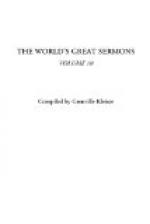Beloved friends, when spurious liberalism, with all her literature, produces such a roll-call as this; when out of her pages I may see coming a nobler set of forces for the making of manhood, then, and only then, will I give up my Bible; then, and only then, will I cease to pray and labor that it may be given to all the world.
HILLIS
GOD THE UNWEARIED GUIDE
BIOGRAPHICAL NOTE
Newell Dwight Hillis was born at Magnolia, Iowa, in 1858. He first became known as a preacher of the first rank during his pastorate over the large Presbyterian church in Evanston, Illinois. This reputation led to his being called to the Central Church, Chicago, in which he succeeded Dr. David Swing, and where from the first he attracted audiences completely filling one of the largest auditoriums in Chicago. In 1899 he was called to Plymouth Church, Brooklyn, to succeed Dr. Lyman Abbott in the pulpit made famous by the ministry of Henry Ward Beecher. By his strong personality and mental gifts he draws to his church a large and eager following. His best known books are “A Man’s Value to Society,” and “The Investment of Influence.”
HILLIS
Born in 1858
GOD THE UNWEARIED GUIDE[1]
[Footnote 1: By permission of the Brooklyn Daily Eagle. Copyright, 1905.]
Comfort ye, comfort ye, my people, saith your God, &c.—Isaiah xl., 1-31. He shall not fail, nor be discouraged.—xliv., 4.
This is an epic of the unwearied God, and the fainting strength of man. For splendor of imagery, for majesty and elevation, it is one of the supreme things in literature. Perhaps no other Scripture has exerted so profound an influence upon the world’s leaders. Luther read it in the fortress of Salzburg, John Brown read it in the prison at Harper’s Ferry. Webster made it the model of his eloquence, Wordsworth, Carlyle and a score of others refer to its influence upon their literary style, their thought and life. Like all the supreme things in eloquence, this chapter is a spark struck out of the fires of war and persecution. Its author was not simply an exile—he was a slave who had known the dungeon and the fetter. Bondage is hard, even for savages, naked, ignorant, and newly drawn from the jungle, but slavery is doubly hard for scholars and prophets, for Hebrew merchants and rulers.
This outburst of eloquence took its rise in a war of invasion. When the northern host swept southward, and overwhelmed Jerusalem, the onrushing wave was fretted with fire; later, when the wave of war retreated, it carried back the detritus of a ruined civilization. The story of the siege of Jerusalem, the assault upon its gates, the fall of the walls, all the horrors of famine and of pestilence, are given in the earlier




